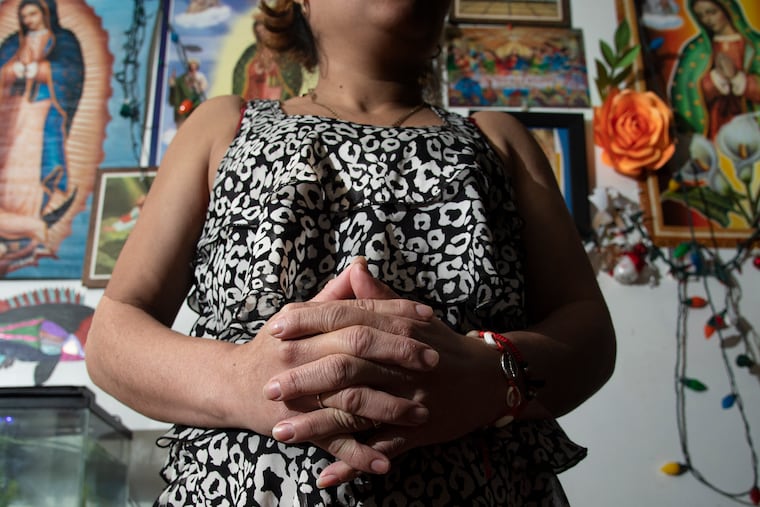The mom arrested by ICE outside a South Philly school is now facing deportation
Verónica del Carmen Lara Márquez, who was released by ICE after the arrest "for humanitarian reasons,” has been told she has 45 days to leave the country.

The mother arrested by ICE agents outside a South Philadelphia school this month and then released by the agency for “humanitarian reasons” has been told she must leave the country within 45 days.
The agency confirmed Wednesday that Verónica del Carmen Lara Márquez, who was placed under monitoring after her Feb. 11 arrest, has been given 45 days to leave the United States. ICE, the U.S. Immigration and Customs Enforcement agency, said it’s simply carrying out an immigration judge’s 2012 order to remove her.
Still, questions remain about the case. The agency did not disclose why Lara Márquez was targeted by agents eight years later, or provide her documentation related to the judge’s order.
In an interview this week, Lara Márquez, 32, who is three months pregnant, told The Inquirer she has lived a peaceful existence in Philadelphia after leaving El Salvador in 2011. She said she didn’t know about the deportation order — which ICE said was issued in absentia — until she was arrested by plainclothes agents after dropping off her 4-year-old daughter at Eliza B. Kirkbride Elementary.
ICE officials wouldn’t comment on whether Lara Márquez’s pregnancy could affect her deportation.
But her situation and the lack of information are not unique, said Philadelphia immigration attorney Ricky Palladino. “We get calls like this every single day,” he said.
» READ MORE: Concern rises following ICE arrest of mother after she dropped off child at South Philly school
Sitting beside her husband inside the home they share with her father and mother-in-law, Lara Márquez said in Spanish that she is confused and worried. She doesn’t know what prompted her arrest this month, saying she hasn’t had prior interactions with law enforcement. She doesn’t know why ICE says she’s from Honduras — among other inaccuracies she noted with the agency’s information.
And she doesn’t have any written order outlining the instructions she has been given to leave the country — save for a Post-it note from the case specialist assigned to monitor her.
“Directo (sin escala en USA),” the note reads — referring to a direct flight. No layovers.
Lara Márquez said the agents told her they were releasing her after her arrest because of her daughter. She was placed in the agency’s Intensive Supervision Appearance Program, according to paperwork signed by ICE agents.
Since then, a case specialist with BI Incorporated — the monitoring company that contracts with ICE — has visited her at home and recorded information about other members of the household.
Lara Márquez said the specialist initially told her deportation would be a long process. Then last Thursday, the specialist told her she had 45 days to leave, Lara Márquez said.
A spokesperson for BI Incorporated referred all questions to ICE.
“Once an immigration judge issues a final order… ICE has no choice but to effect the removal,” said an ICE official, who spoke on condition of anonymity because he wasn’t authorized to discuss the case publicly.
Over the years, U.S. Customs and Border Protection processed and released people caught entering the U.S., with instructions that they would have to show up for court at a later unspecified date, Palladino said. But people crossing the border don’t necessarily know where they will be staying, so the addresses they provide may not be accurate. Court notices may be sent to old addresses, and if individuals don’t show up for their hearing, a judge can issue a deportation order in their absence.
That order is final.
“The only thing she could do now to stay here is get her removal proceedings reopened,” Palladino said. He said if ICE’s records about Lara Márquez were incorrect, that could be grounds to reopen the order.
The ICE official said that the agency’s records are based on the information Lara Márquez provided when she crossed the border but that ICE is investigating the situation.
As for how ICE may have caught up to Lara Márquez eight years after the order, Palladino said she could have filed some immigration paperwork that put her status on the agency’s radar, or someone could have called in a tip.
“For the person, it’s really bad luck,” he said.
Lara Márquez and her husband say they are waiting for further information
“If they go back, they will suffer a lot,” Lara Márquez’s father-in-law said this week. The father-in-law, who has Temporary Protected Status, said he and his family left El Salvador because of poverty.
“We do have to pay a lot of money to live in the U.S., but there is also work and there is food,” he said. While he and his son work, Lara Márquez takes care of chores and the young children at home.
Lara Márquez’s father-in-law saw her arrest and ran from the second floor of their rowhouse out onto the street to tell agents to be careful with her because she’s pregnant.
Until that point, he didn’t know Lara Márquez had a deportation order against her. He said he has been praying — the family attends the Basilica of SS. Peter and Paul — and worries about repercussions for the rest of his family.
“I will die if I lose them,” he said.